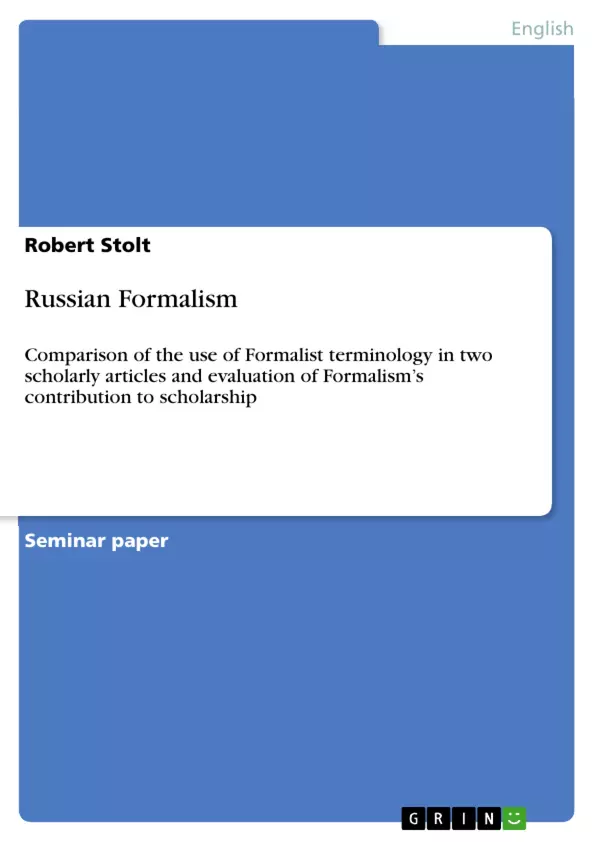In the course of this essay the terminology that was applied by the Russian Formalist theoreticians shall be investigated (many terms were even invented and introduced by the Formalists themselves). More precisely, a careful look will be taken at how the literary critics, Medvedev and Bakhtin in The Formal Method in Literary Scholarship and Hansen-Löve in Der Russische Formalismus examine the Formalist terms. In order to evaluate Formalist terminology accurately and objectively, the mentioned critics’ theories shall be underpinned by and contrasted with the opinion of other critics in this field.
Two of Shklovsky’s articles, The Resurrection of the Word and Art as Device are taken as a starting point for paving the way for a detailed analysis of the formal terminology.
The major focus lies on the term ‘ostranenie’ that was firstly introduced by Shklovsky (1991) and is most commonly translated as ‘estrangement’, ‘defamiliarisation’ or ‘making it strange’. The essay shall not only analyse the origins of this concept, but furthermore, compare the different interpretations the term entails. Hansen-Löve’s evaluation of the concept of ostranenie as well as Medvedev and Bakhtin’s assessment of Shklovsky’ analysis of Tolstoy’s
Kholstomer in the view of estrangement reveals the critical approach on which this essay is based on.
Moreover, the Russian term of ‘obnazenie’, the ‘laying-bare’ of the work (Hansen-Löve, 1978) and ‘oveshchestvlenie’, the process of materialisation (Medvedev & Bakhtin, 1978), shall be regarded throughout this essay, since both concepts go hand in hand with the idea of ostranenie.
In the last part of the essay, the formal theory of shutting out subjective consciousness from the work (Medvedev & Bakhtin, 1978) and the effects of this concept are in the centre of the attention. This shall lead to the final evaluation of the quality in the formalist concept of perception.
Inhaltsverzeichnis (Table of Contents)
- Introduction
- Ostranenie, Obnazenie and Oveshchestvlenie
- The Formalist Theory of Perception
- Conclusion
Zielsetzung und Themenschwerpunkte (Objectives and Key Themes)
This essay aims to investigate the terminology used by Russian Formalist theoreticians, particularly focusing on the concepts of "ostranenie", "obnazenie", and "oveshchestvlenie". It will compare the interpretations of these concepts by different critics, such as Medvedev, Bakhtin, and Hansen-Löve, and evaluate the contribution of Formalism to scholarship.
- The role of "ostranenie" (estrangement) in literary art and its relationship to the process of defamiliarization.
- The concept of "obnazenie" (laying-bare) and its connection to the Formalist focus on form and composition.
- The idea of "oveshchestvlenie" (materialization) and its relationship to the Formalist attempt to divorce literary works from ideological significance.
- The Formalist theory of perception and its impact on the interpretation of literary works.
- The criticisms of Formalism and its limitations in terms of universality and methodology.
Zusammenfassung der Kapitel (Chapter Summaries)
- Introduction: This chapter introduces the essay's focus on Russian Formalist terminology, specifically the terms "ostranenie", "obnazenie", and "oveshchestvlenie". It outlines the critical approaches taken by Medvedev, Bakhtin, and Hansen-Löve and highlights the importance of analyzing Shklovsky's articles, "The Resurrection of the Word" and "Art as Device".
- Ostranenie, Obnazenie and Oveshchestvlenie: This chapter examines the concept of "ostranenie" in detail, exploring its origins, its different interpretations, and its relationship to the artistic process. It then delves into the concepts of "obnazenie" and "oveshchestvlenie", comparing them to the Formalist theory of materialization and exploring their relationship to the idea of estrangement.
Schlüsselwörter (Keywords)
Key terms and concepts explored in this essay include Russian Formalism, "ostranenie" (estrangement), "obnazenie" (laying-bare), "oveshchestvlenie" (materialization), defamiliarization, artistic device, perception, literary scholarship, and the works of Viktor Shklovsky, Pavel Medvedev, Mikhail Bakhtin, and Aage Hansen-Löve.
Frequently Asked Questions
What is the concept of "ostranenie" in Russian Formalism?
"Ostranenie," introduced by Viktor Shklovsky, refers to "estrangement" or "defamiliarization." It is the artistic technique of presenting common things in an unfamiliar or strange way to enhance perception.
What does "obnazenie" mean in a literary context?
"Obnazenie" refers to the "laying-bare" of the device. It is a technique where the literary work reveals its own formal construction to the reader.
How do Medvedev and Bakhtin critique Russian Formalism?
Medvedev and Bakhtin examine the formal method critically, particularly focusing on how Formalism attempts to divorce literary works from ideological and social significance through "oveshchestvlenie" (materialization).
What is Shklovsky's "Art as Device" about?
"Art as Device" is a foundational essay where Shklovsky argues that the purpose of art is to lead us to a knowledge of a thing through the organ of sight instead of recognition, using defamiliarization.
What is the Formalist theory of perception?
The Formalist theory suggests that habitual perception becomes automatic; art exists to break this automatism by making forms difficult and increasing the length of perception.
- Citation du texte
- Robert Stolt (Auteur), 2009, Russian Formalism, Munich, GRIN Verlag, https://www.grin.com/document/145245



